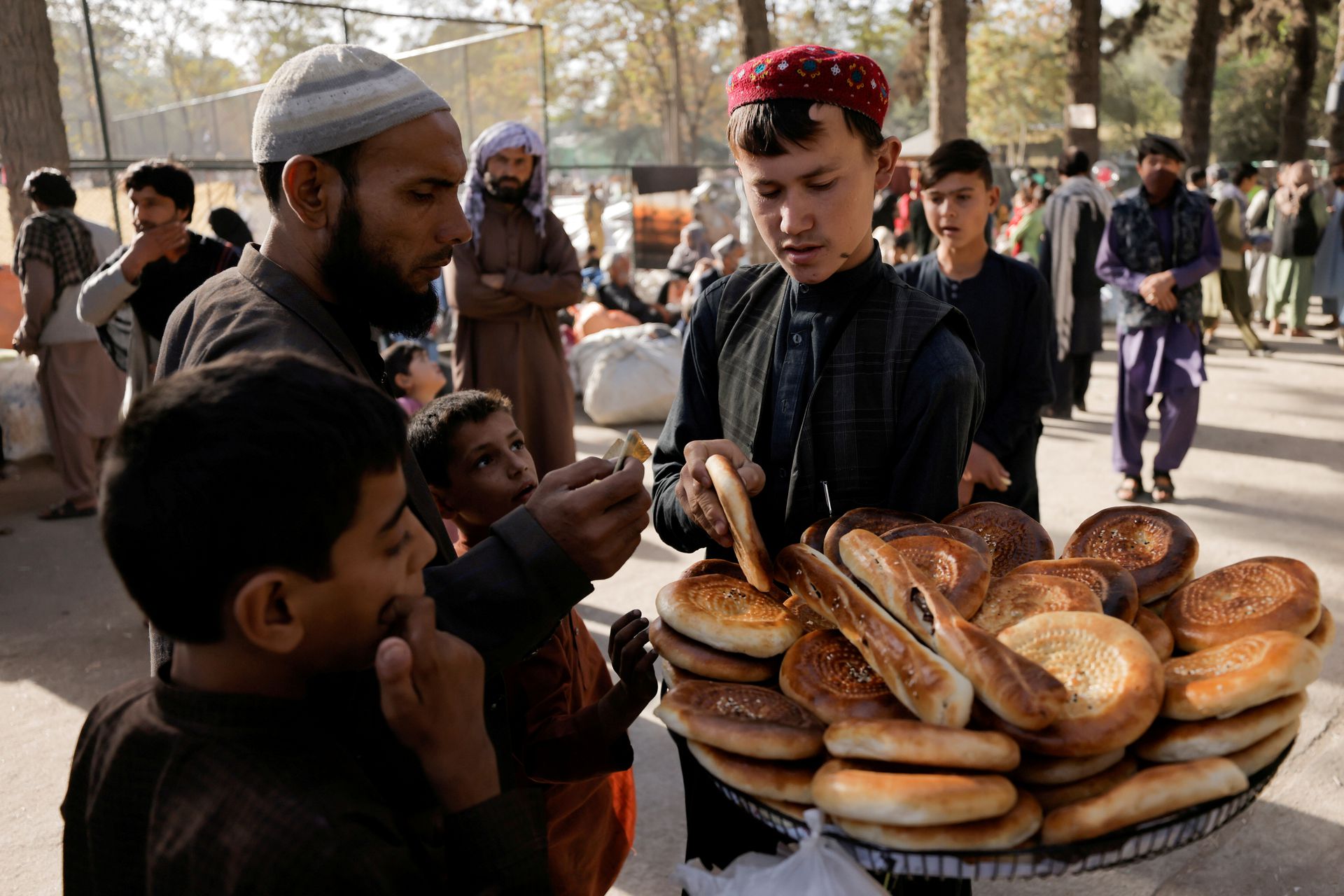
Afghanistan is in the throes of a major food shortage caused by the sudden stoppage of funds by foreign agencies. India, which has historical ties with the war-torn country, should rally a global support for the suffering Afghans
Afghanistan under the Taliban is faced with a crippling crisis the extremists, perhaps, never realised before. The country is struggling to cope with a major food shortage caused by the sudden stoppage of funds supply from foreign agencies, which must be addressed by the
world community before it is too late. The crisis is the result of the stoppage of much of the financial aid the country had been getting till the US-backed government was there in Kabul.
United Nations Development Programme (Asia) Director Kanni Wignaraja said a few days back that the sudden dramatic withdrawal of international aid was an unprecedented fiscal shock Afghanistan has been suffering from after Taliban rule was re-established as a result
of a long struggle of over two decades.
This has led to a situation when lives of nearly 23 million Afghans — over 50 per cent
of the country’s population — including 3.2 million children, are threatened, according to the UN’s Food and Agriculture Organisation (FAO) and the World Food Programme (WFP). There is an opportunity for India, which has historical relations with Afghanistan and has already spent a lot on rebuilding of that country, not only to come forward with more
economic aid to save the Afghans in distress, but also with a plan to persuade the global community to ensure that the people of the war-torn country should not suffer if Taliban factions have recaptured power in Kabul. This is the best way to make China less attractive for the Afghans as also to compel the Taliban to mend their ways to become dependable for the outside world.
Experts are of the view that the Taliban rulers today are not what they were when they first established their government in 1996-97 in a confusion-filled scenario. They are now battle-hardened, reformed politicians, serious about successfully governing their country with a
clear-cut objective of putting Afghanistan back on the road to socio-economic recovery. Therefore, the world community, instead of putting a spanner in the works, should facilitate the task of rebuilding the country destroyed by the circumstances beyond anyone’s control.
There is a major human crisis which must be tackled effectively. Any kind of contribution to get people engaged in economic activity is bound to promote peace and stability in Afghanistan and beyond. Yet, in the midst of all that is going on there, the world needs to have a close look at outside forces like Pakistan that may be in search of opportunities to play negative politics.
The recently held Delhi Regional Security Dialogue on Afghanistan, mainly aimed at discussing the evolving security scenario and its regional and global ramifications, could not avoid expressing concern over the worst socio-economic and humanitarian crisis faced by Kabul. The unanimously agreed declaration issued at the end of the dialogue underlined the need to provide “urgent humanitarian assistance to the people of Afghanistan”.
The Delhi declaration also had it that “humanitarian assistance should be provided in an unimpeded, direct and assured manner to Afghanistan and that the assistance is distributed within the country in a non-discriminatory manner across all sections of the Afghan society.”
The participants in the regional dialogue, held in New Delhi at the initiative of India’s National Security Adviser (NSA) Ajit Doval, included the NSAs from Iran, Russia, Kazakhstan, Kyrgyzstan, Tajikistan, Turkmenistan and Uzbekistan. China and Pakistan, not
surprisingly, preferred to stay away.
The declarations that Afghanistan’s territory should not be allowed to be used for terrorism and efforts must be made to prevent radicalisation of society are bound to get support from one and all. But the prevailing circumstances demand that the global community, as
its top priority, must also focus on saving millions of Afghan lives, including those of children, which may be lost due to an acute food shortage in the landlocked country if timely help remains missing.
Realisation has ultimately dawned on Pakistan, which has at last listened to saner advice for allowing the transportation of 50,000 tonnes of wheat plus life-saving medicines to Afghanistan from India through its land route, part of the blocked humanitarian assistance
worth Rs 5 billion, but this is not enough. More needs to be done to save the threatened lives in Afghanistan.
The prevailing food crisis in Afghanistan will become more acute as winter fully sets in when most parts of the country will be snow-bound, difficult to be accessed by anyone engaged in humanitarian activities.
In fact, the WFP and UNICEF (the United Nations Children’s Fund) had warned as early as in October that “one million children are at the risk of dying from severe malnutrition without immediate life-saving treatment” in Afghanistan. A horrible situation, indeed! The
continuing drought and the situation that has emerged after the Taliban takeover of the
country have worsened the already grim scenario there. Afghanistan is headed for famine-like conditions if the world does not act fast to save innocent lives.
According to the WFP’s Deputy Regional Director for Asia and the Pacific, Anthea Webb, “The drought (second drought in less than three years) has reduced the amount of food that people can grow; so crops are down by 40 per cent. Jobs have evaporated, and food
prices have gone up. And so, all combines to be a perfect storm for people who were already very poor and on the edge prior to the events of August (when the Taliban recaptured power in Kabul).”
It is believed that much of Afghanistan’s financial difficulties can come to an end if the
US de-freezes Kabul’s nearly $9.5 billion in assets belonging to the Afghan Central Bank. But the Joe Biden administration argues that it cannot allow a Taliban-led government to access the seized money mainly because the Taliban still remains on the US Treasury
Department’s “sanctions list”. This is what the Americans describe as a “technical” factor that comes in the way of Afghanistan’s national funds being out of bounds for the Taliban government.
If this “technical” factor is removed immediately, it may save Afghanistan from the catastrophic consequences it is likely to face under the prevailing circumstances. The ultimate beneficiaries will be the people of Afghanistan. It is not the people’s fault if Taliban
factions happen to be ruling the roost. Such gestures may make the Taliban undergo a major transformation to the liking of the global community.
“If the current situation prevails, the Afghan government and people will face problems and will become a cause for mass migration in the region and the world which will consequently create further humanitarian and economic issues,” Taliban Foreign Minister Amir Khan
Muttaqi recently said in an open letter aimed at shaking the conscience of Washington DC. The letter clearly told US Congress members to make the Afghan assets accessible to Kabul, otherwise economic turmoil in Afghanistan could lead to trouble abroad. He made an appeal to the US again a few days back, seeking release of Afghanistan’s seized funds
by ending the black lists and the sanctions at a meeting in Doha (Qatar) with the US Special Representative for Afghanistan.
The new government in Kabul is unable to get sufficient financial aid from abroad primarily because no country has so far recognised the Taliban’s rule there. Not even Saudi Arabia, the UAE and Pakistan which were among the few countries which had come forward to
establishing diplomatic relations with the Taliban administration in 1996-97.
The world cannot afford to keep quiet while millions of Afghan lives remain endangered. A way must be found to ensure that the flow of foreign funds to Kabul is again there as a humanitarian gesture. The cause of peace and stability in the world also demands it.











